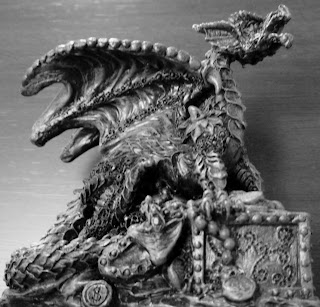The Potency of the Words and the Wonder of the Things: A Review of His Majesty's Dragon by Naomi Novik
 His Majesty’s Dragon,
written by Naomi Novik and published in 2006, is an extremely satisfying read
about a ship’s captain Will Laurence who serves in the British navy during the
Napoleonic Wars until he captures an enemy ship carrying precious cargo: a rare
dragon egg. As a result, he must leave his position—in both the navy and
society—to join the Aerial Corps. He forms an unexpected bond with the young
dragon Temeraire, and the two must work together and with their new comrades to
battle Napoleon’s dragon-borne forces and defend Britain.
His Majesty’s Dragon,
written by Naomi Novik and published in 2006, is an extremely satisfying read
about a ship’s captain Will Laurence who serves in the British navy during the
Napoleonic Wars until he captures an enemy ship carrying precious cargo: a rare
dragon egg. As a result, he must leave his position—in both the navy and
society—to join the Aerial Corps. He forms an unexpected bond with the young
dragon Temeraire, and the two must work together and with their new comrades to
battle Napoleon’s dragon-borne forces and defend Britain.
Jane Austen and
Christopher Paolini
I was mildly concerned when I saw a Time review quoted on the back of the book, “like Jane Austen
playing Dungeons & Dragons with Eragon’s
Christopher Paolini,” but I needn’t have worried. The work was striking and
imaginative. The reference to Paolini seems to have been born simply from the
story’s inclusion of dragons as characters. The mention of Austen, however, I
found pleasantly borne out in Novik’s writing style—in the story’s pacing and
emphasis on character development.
Pacing Allows
Powerful Writing
The story begins slowly. Readers are introduced to Laurence
just after a sea battle, instead of being dropped gracelessly in the middle of
the action. Within the first couple pages I found myself thoroughly intrigued by
him, and no dragon yet in sight! Novik takes her time reintroducing her readers
to a history they vaguely recall as their own. She does not shy away from the
hard work of creating an inner consistency of reality within her world, but seamlessly
integrates history with fantasy. She not only imagines the Napoleonic Wars being
fought on the backs of dragons; she puts in the labor and thought to make such
a world believable. She does not seek to blind her reader with drastic actions
scenes or exaggeratedly witty humor, but invests them in the vibrant emotions
of her characters and the simple beauty of the world we know, as seen through
dragon eyes.
“The Potency of the
Words, and the Wonder of the Things”
J. R. R. Tolkien, in his article “On Fairy-stories,” wrote, “It
was in fairy-stories that I first divined the potency of the words, and the
wonder of the things, such as stone, and wood, and iron; tree and grass; house
and fire; bread and wine” (The Monsters and the Critics 147). Naomi Novik does
this with great success. The pacing of her story allows her to bring forth that
potency and wonder in the things we already know and blend them with the fascination
of the mythical. The result is wonderful art.
C8lin
C8lin


Comments
Post a Comment